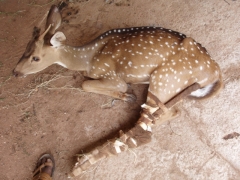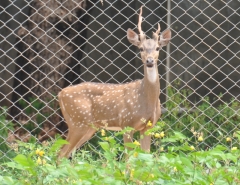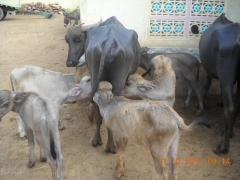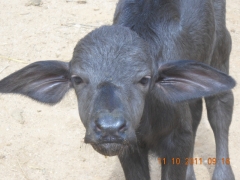
Karuna Society For Animals And Nature
Newsletter 2011.12
Update on Rescued Painted Storks The season for Painted Storks has come and gone. Thousands of birds that had been breeding have left. The younger ones followed a little later after the adults. They know where to go. There is no breeding season without fatalities, injuries and accidents. This year, thanks to the major support of the Rapid Action Plan of Wildlife Trust of India, Karuna rescued 198 birds. Most of these were chicks that had fallen out of their nests. The annual nursery was immediately constructed with round the clock care and the consumption of 1045 kg of fish. The wounded adults were given medical treatment, but unfortunately not all of them made it. 125 rescued birds were saved and rehabilitated back into the wild. One stork that recovered was not able to fly and will be transferred to a wildlife center that has a large aviary. Thank you to all those who helped these magnificent birds! | |||
| |||
Spotted Deer recovers from a leg injury and is released back into the wild In July, a young spotted deer was brought in by the forest department. Her leg was deeply infected, inflamed and paralyzed. The chances of recovery at this stage were minimal. We started immediate treatment, and the infection seemed to heal, but the left foot was still not functioning. With further exploration we found two deeper wounds that went down to the bone. These wounds took five months to heal. After one year, fully recovered, this beautiful spotted deer was released back to its original habitat with the help of the forest department officials. The wildlife doctor from Wildlife Trust of Indiais still amazed that the deer survived. | |||
Animal Protectors Plan Implementation of Laws The Federation of Indian Animal Protection Organisations (FIAPO), Animal Welfare Board of India (AWBI) and Humane Society International (HSI) organised a workshop on implementing animal laws in India on September 3rd and 4th in New Delhi. The workshop was inaugurated by Maj. Gen. Dr. R.M. Kharb (Retd.), Chairman, Animal Welfare Board of India. The resource persons included leading lawyers like senior advocate Raj Panjwani (Supreme Court and Delhi High Court), Padmashree Mrs. Norma Alvares (Goa and Mumbai High Court), Anjali Sharma (Supreme Court and Delhi High Court), Brindha Nandakumar (Karnataka High Court) and N.G.Jayasimha (Campaign Manager, Humane Society International). “India has some of the best animal protection legislations, but this is seldom implemented due to lack of awareness amongst activists, law enforcement agencies, and judiciary. We urge animal welfare organisations to take proactive measures to implement the legislation,” said Chairman of AWBI in his inaugural address. Thirty five participants were given practical tools on issues relating to criminal procedure, dogs and companion animals, animal experimentation, intensive confinement of farm animals, illegal transport, slaughter and captive wildlife. Romula D’Silva, Vice-President of Karuna Society, attended this workshop and felt that it was a very educative and empowering experience, and that the event was extremely well organised. At the end of the workshop the AWBI Chariman, Major General Dr. R.M. Kharb, gave out a certificate to each participant and also announced that all workshop participants will be appointed as “Honorary Animal Welfare Officers” by the AWBI. | |||
The Plight of the Buffalo Karuna Society has rescued buffaloes as well as other cows and cattle since 2002. At present in 2011 we are the ‘happy owners’ of 46 male buffaloes, all castrated, 64 female buffaloes and 140 cows. By law, the definition of “cow” includes the buffalo and her offspring. Buffaloes have the same rights for protection as cows. But animal welfare Organisations and Goshalas (protected shelters for cows in India) rescue mainly local and milking cows. For these animals they might receive support from spiritually oriented donors and/or their milk byproducts can be sold. NOT SO FOR THE BUFFALO! Lacking the spiritual respect an Indian cow receives by tradition, buffaloes are raised only for milk and meat. The male buffaloes cannot work in our area because they are very slow, and they cannot stand the heat. The climate is too dry and hot for them. They are originally water buffaloes and worked only in areas with plenty of water. But now they are only bred for milk and meat, and are left to starve to death or are slaughtered for leather production or for animal sacrifice. The rescue and maintenance of buffaloes have several moral and practical pitfalls. All our cattle graze outside part of the year for eight hours a day. Although we have castrated all our male buffaloes, the females in heat know how to find the village bull during grazing time. They get pregnant and deliver their calves. The milk, approximately five litres per day from five or six animals, is used for our shelter animals. We do not want milk production, and there is no financial support whatsoever for these animals. So it is a drain on our resources as the herd continues to grow. Only their dung can be used for biogas and composting. The Animal Husbandry Department is in charge of all animal production for the benefit of people, but not for the benefit of animals. As long as the Department is involved in the breeding of milk buffaloes, and the AWBI (Animal Welfare Board of India) supports the milk production from goshalas, there is no way out. If we give buffaloes out for adoption, they go back into milk production and will continue to produce male calves that will be sold for slaughter. This is not an option. Although buffaloes are as equally protected by law as the cow, everybody seems to accept that they are only an industrial product for milk, meat and leather. As we are not able to control buffalo reproduction completely, all our bulls are castrated. We have taken the step to start tubectomies on the female buffaloes so that she will not be able to get pregnant. As this is a completely new concept in India, we are hoping that other organisations will consider using this method to help save the life of the buffalo, since her future is otherwise bleak. | |||
| |||
PLEASE ADOPT ME! A few days ago we received a small male buffalo, only a few hours old, as his mother has just died. The owner did not want to send him to slaughter, which we were grateful for. The owner did the ” good deed” and the lucky buffalo remains with us for the rest of his life. We will be faced with 15 years or more of maintenance for a big buffalo bull whom we named Romeo. “Hi, I am Romeo. I just lost my mother, but at present I have a big black foster mother with wonderful milk. Soon I will join my pals at the fast food restaurant (see first picture!). Is there anybody out there who wants to contribute to my upkeep?” |
- For more information please visit our website www.karunasociety.org or email us at karunasociety(at)gmail.com.





